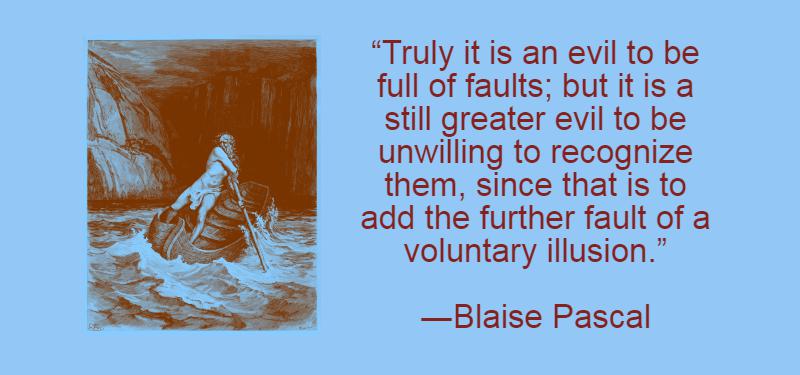In ancient philosophy, arete, translated as excellence or virtue, was often held as the goal of a lifetime. Excellence can be developed through insight and habit. It's important to have insight about your negative personality traits if you want to change them. Usually just a small part of your total personality is actively holding you back and keeping you from flourishing in life as you might if your faults were corrected.
Examining your own character flaws is actually not the easiest thing to do. We innately resist looking at our truly negative qualities as a matter of psychological self-preservation. So how can we identify and work with our own shortcomings? Uncovering your faults takes some maturity and courage. These 5 techniques inspired by the ancient philosophical tradition and Jungian psychology have helped me to gain more insight into my personal failings, and I hope they will be helpful to you as well.
Terrance Hoyt from Practical Philosophy states:
The shadow is a moral problem that challenges the whole ego-personality, for no one can become conscious of the shadow without considerable moral effort. To become conscious of it involves recognizing the dark aspects of the personality as present and real. This act is the essential condition for any kind of self-knowledge, and it therefore, as a rule, meets with considerable resistance. Indeed, self-knowledge as a psychotherapeutic measure frequently requires much painstaking work extending over a long period.
In short, expect the process of self-assessment and improvement to be ongoing. This isn't some kind of life hack that you can spend an hour doing and then be over with. But it is absolutely possible to make real progress on your character. I feel like I have grown by leeps and bounds since I made excellence one of the main priorities in my life.
1. Look at Yourself From Your Enemy's Perspective
This is a brilliant piece of advice because if you imagine looking at yourself from your enemy's perspective, you are bound to see something very different than you do when you think about yourself.
If you are living by the silver rule - do NOT do to others what you don't want them to do to you - then hopefully you don't have any true enemies! But still, imagine the perspective of someone who is or has been critical of you. What would they say your faults are?
2. Keep a Personal Journal
Hadot notes that writing helps you explain yourself to yourself. Writing helps take the place of another person's eyes. The writer instinctively feels as though he is being watched. This process helps makes what was confused on subjective more objective and universal for the writer. One observes one self to see what progress they have made using writing as an exercise.
I can speak to the therapeutic and personal growth value of keeping a journal. I began doing so in 1996, and it is helpful to look back and see how far I have come in terms of developing my character.
3. Examine What Keeps Coming Up in Your Evening Review
(And I know you are doing your Stoic reflective practice every night without fail! - Just joking - I myself forget more often than I would like).
For me, the negative tendencies that come up over and over again in my evening reviews are: being distracted, not listening actively, missing opportunities to say something positive or brighten someone's day, raising my voice at someone, getting annoyed, and not maintaining equanimity when under stress.
What this translates to in terms of my character flaws is that I am too impatient, abrupt and temperamental. These negative qualities could be countered with more of the virtues patience, justice, and moderation for example.
4. Observe Your Projections
Say you can't stand Donald Trump because he is so self-important. Perhaps Donald is actually a kindred spirit, and deep down you recognize your own overblown sense of grandiosity. Or say that you dislike Hillary Clinton because of her pathological pursuit of power. Maybe you dislike your own ineptitude and you wish that you were more self-actualized.
According to Marcus Aurelius, "Nothing has such power to broaden the mind as the ability to investigate systematically and truly all that comes under thy observation in life."
5. Do a Self-Assessment
(And, I should add, not a substitute for therapy. If you feel like you have problems too big to deal with on your own, by all means seek professional help.)
This questionnaire will help you think about both your past mistakes and your present shortcomings in a constructive way so that you can learn from them and move on in your journey towards excellence. If you want to forget your past, then you probably have unfinished business that a little insight will help you transcend.
"Truly it is an evil to be full of faults; but it is a still greater evil to be full of them and to be unwilling to recognize them, since that is to add the further fault of a voluntary illusion." - Blaise Pascal
~
You May Also Like:
21 Traits of a Good Character
How Introspection Can Teach You Everything You Need to Know About Yourself
5 Signs You Lack Maturity According to Cicero










